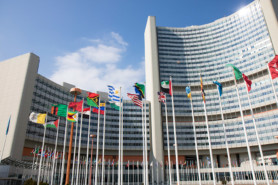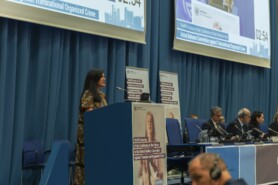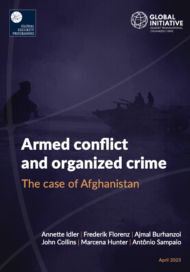Event Details
Where
Universal College Lahore
Posted on 11 Dec 2024
Pakistan is at a critical juncture in its battle against transnational organized crime, a multifaceted threat that affects all sectors of society. Criminal networks have transformed the country into a pivotal destination point and transit hub for illicit activities, exploiting its geographical location to facilitate a wide range of criminal economies, including drug trafficking, human trafficking and migrant smuggling. These crimes not only destabilize the region, but also undermine the rule of law, threaten national security and hinder economic development.
On 15 November 2024, a roundtable discussion was held at Universal College Lahore, both in-person and online, to mark the first United Nations International Day for the Prevention of and Fight against All Forms of Transnational Organized Crime. Organized by the Global Initiative Against Transnational Organized Crime in collaboration with the Centre for Governance Research and the Centre for Human Rights, the event assembled a panel of experts from government, civil society and academia to discuss the urgent need for comprehensive and collaborative approach to dismantling criminal networks that threaten Pakistan’s sovereignty and development.
As the international community approaches the 25th anniversary of the UN Convention against Transnational Organized Crime (UNTOC), the roundtable provided a crucial space for reflection and the development of forward-looking strategies to address the evolving landscape of transnational organized crime in Pakistan and the wider region. The event aimed to share insights and propose practical measures to counteract the illicit activities that fuel national and regional instability.
In this context, the international day of observance offered an opportunity to assess existing efforts and identify critical gaps in Pakistan’s response to organized crime. More than a symbolic gesture, this commemoration represents a global commitment to combating organized crime and a resounding call for immediate, decisive national action. Pakistan, like many countries, must continually adapt its strategies and responses to meet the ever-changing tactics of criminal networks and the rapid advancement of technologies. The roundtable discussion sought to respond to this need by providing a platform for experts to discuss innovative approaches, foster collaboration and promote policy development aimed at strengthening Pakistan’s resilience to organized crime.
The discussion covered a range of urgent issues, with migrant smuggling and human trafficking emerging as two of the most pressing. Participants highlighted how criminal organizations systematically exploit vulnerable populations for profit, often targeting migrants fleeing conflict and economic hardship. The roundtable emphasized the critical need for Pakistan to bolster its legal frameworks and enforcement capabilities to combat these crimes effectively, and advocated for stronger international cooperation, enhanced border control measures and comprehensive support systems for victims.
The event also provided nuanced insights into the strengths and weaknesses of Pakistan’s existing infrastructure to combat organized crime. While acknowledging significant efforts at the federal and provincial levels, participants discussed the challenges faced by law enforcement agencies. These include insufficient resources, difficulties with inter-agency coordination and limited legal mechanisms to address the full spectrum of transnational criminal activity. A consensus emerged around the need for a more integrated, data-driven approach that prioritizes capacity building for law enforcement, expanding training programmes and increasing regional cooperation.
Regional cooperation was recognized as a fundamental strategy in enhancing resilience. Pakistan’s strategic location, bordering several key regions affected by transnational organized crime, positions the country as a critical player in regional security and stability. The discussion underscored the importance of greater coordination between Pakistan and its neighbouring countries, as well as with international partners such as the UN Office on Drugs and Crime and civil society organizations. While acknowledging existing efforts to mitigate cross-border crimes in the region, participants stressed the need for more robust collaborative frameworks to facilitate the effective exchange of information, resources and expertise between nations.
Technology was identified as both a challenge and a potential solution. Organized criminal groups are exploiting technological advancements, creating new opportunities for illegal activities and posing an even greater challenge to governments and law enforcement. Criminal networks are increasingly using digital tools and platforms to facilitate their illegal operations, from dark web markets to encrypted communication channels. The roundtable considered strategies for harnessing technology to track illicit financial flows, dismantle trafficking networks and enhance the transparency of criminal investigations. Participants also called for a stronger legal framework to regulate digital platforms and to ensure that law enforcement agencies are equipped with the necessary tools to fight crime in the digital era.
Civil society organizations were recognized as indispensable partners in addressing organized crime. In Pakistan, civil society groups with experience in governance reform, human rights and criminal justice have been instrumental in raising awareness, advocating for policy reforms and providing support for victims. By bringing civil society together in conversation with experts from diverse sectors, the event provided a platform for meaningful dialogue and promoted efforts towards collaborative action, underscoring the importance of a holistic and multisectoral approach that transcends law enforcement paradigms.
As Pakistan prepares for the 25th anniversary of the UNTOC, the Lahore roundtable offered not only a moment of reflection but also served as a call to action. The outcomes of the discussion will inform policy recommendations and initiatives aimed at strengthening the country’s response to transnational criminality. Moving forward, it is essential for all stakeholders to work together to realize the strategies discussed during the event. Through continued dialogue, the sharing of best practices and a commitment to innovation, Pakistan can take meaningful strides towards ensuring a safer and more resilient society. In the words of this year’s theme, ‘Organized crime steals, corrupts, and kills. It’s time we pull together to push back.’



